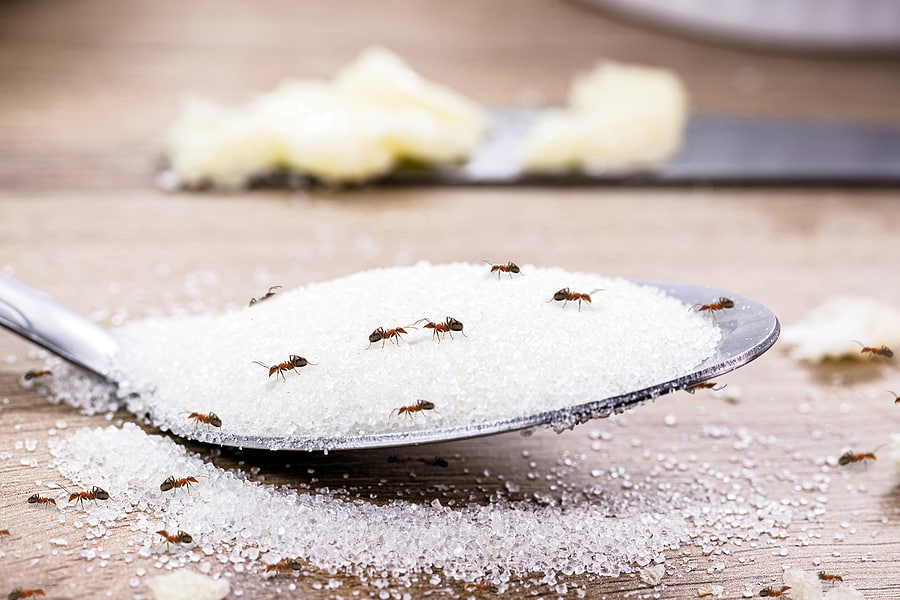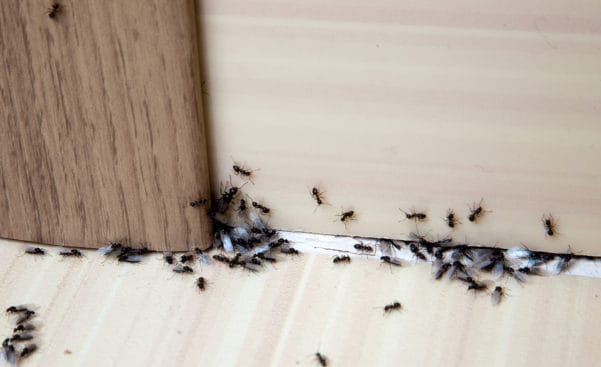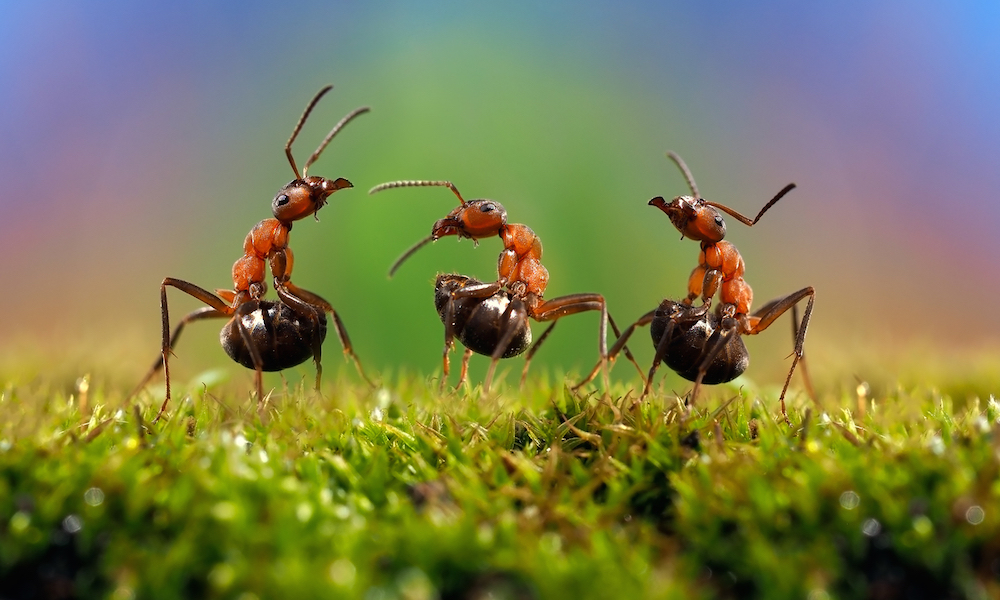READY TO GET STARTED?
REQUEST A FREE ESTIMATE
Fill out the form below or call (888) 466-7849 for a free, no-obligation estimate.

Once they’ve infested your yard, it can be difficult to get rid of ant infestations. These pests are extremely invasive and will search our yards and inside our homes for a place to nest and for a food source. Once ants take over your yard, it’s likely they will enter your home, sometimes without us even knowing. Check out the common ways to prevent ants in your Florida yard.
Keeping your yard well-maintained is crucial in preventing ants from taking over your yard. Make sure you regularly mow your grass and trim back plants and shrubbery away from the home. Likewise, ensure that leaves and debris are picked up, especially after a storm. Get rid of rotten tree stumps or logs, as ants will build their nests in them.
Did you know there are certain smells that will deter ants away? It’s true! Ants dislike scents such as peppermint, vinegar, and citrus. Consider using these scents to deter them away from your yard and home by placing cotton balls soaked in the scent around the perimeter of your property.
Ants are looking for water and food sources to survive, making it crucial to remove them. While many of us leave our pet’s food bowls outdoors during the warmer months, it’s important to remove them at night, as they will attract not only ants but other creatures such as rats and mice. Likewise, remove any standing water from your property, including fixing leaky pipes, removing buckets holding water, and unclogging gutters.
To ensure ants will not enter your home, it’s important to identify and eliminate any entry points they could enter in from. Inspect the exterior of your home and seal any holes, gaps, and cracks you find. Don’t forget to check the areas around pipes and wires as well. Likewise, check your windows and doors for any openings and consider utilizing screens and weatherstripping.
Eliminating ants can seem like a daunting task, but it doesn’t have to be. Consider reaching out to your local pest control company which can help identify the type of ant, provide you with a treatment plan, and set you up with a prevention plan to avoid a future infestation.

The kitchen is one of the most common rooms in your home to have ants, closely followed by the bathroom. The most common ants found indoors are odorous house ants, also known as nuisance ants. While these ants don’t cause structural damage and aren’t considered dangerous to humans or pets, they can contaminate your food and become quite a nuisance to deal with. Carpenter ants are larger black ants that can also get into your home. These ants do cause structural damage by boring through the wood components of your house.
The ants you find in your home don’t actually live there; they build colonies outdoors and come in looking for food and water to take back. These elements are necessary for the colony to live and grow. Scout ants who find these sources leave a pheromone trail for the rest of the colony to follow which is why you will often see ants traveling in a single line. Because they can scale walls and travel between stories in your home, they can spread quickly and be extremely difficult to get rid of.
Ants are attracted by a number of things found in your home. They use crumbs, spills, loosely sealed food packages, dirty dishes, and even pet food bowls to find food. They use leaky pipes, pet water bowls, and standing water for hydration.
What can you do to keep ants from taking over your kitchen? Prevent ants by:
Killing just the ants you find in your home won’t eliminate the entire infestation. You must eradicate them at the source – at their colonies. These ants can be difficult to eliminate because individual colonies can number in the thousands and they can be spread out all over your property. For assistance in dealing with ants or any other pests you may find in your home, contact your local pest control company for an evaluation.
9 Easy Ways to Keep Birds Away

Ants are the most commonly reported pest in the country. While ants can be found just about anywhere in your home, the kitchen and bathroom are the most common rooms they are spotted in. Tiny black ants, also known as “nuisance ants,” or “odorous house ants,” invade your kitchen in search of food and water. While these nuisance pests are quite common, you may not know much about them. Here are 6 things you should know about these ants in your kitchen.
Ants don’t typically live indoors but instead establish colonies around your property. They will then make their way indoors in search of food and water. While odorous house ants can be quite a nuisance when they invade your kitchen, they don’t pose any significant risk to humans or their homes. These ants will feed on food and drink, especially sugary, sweet items and are attracted to crumbs and spills usually found in your kitchen. They don’t, however, bore through wood or cause structural damage to your home.
Ants in the kitchen are usually coming from somewhere and traveling to somewhere. If you follow their trail in both directions you can usually identify the food source that is attracting them. Cleaning up the spill or eliminating the food source will typically eliminate the ant problem. Ants can squeeze through openings the size of a pinhole, however, so while sealing up any entry points you find is a good idea, don’t be surprised if they make their way in again in the future.
Like most pests, ants are seasonal and incidences typically ebb and flow. Ants most commonly spike in the spring and summer when the weather warms up. This increase in temperature also increases their activity, driving them indoors in droves. They are also much more common following unseasonably warm winters. This is also swarming ant season which also increases their activity.
Ants are very social and have developed communication methods between each other. Ants can communicate through touch and through shared food. This communication helps them to avoid repellent remedies. Repellents like chalk that are placed in a line are often avoided by ants who just go around them. Spraying them with repellents will kill a few on contact but will typically just repel the rest, causing them to scatter but not die. A professional can treat ants with non-repellent products that they will take back to their colonies and disseminate among the entire population.
Different species of ants are attracted to different things and are treated in different ways. Proper identification is key to complete elimination. If you have an ant problem, try not to kill them all yourself because then your pest control company cannot identify them accurately. Best practice is to either leave them alone or try to collect samples by using tape to pick up a few and placing them in a Ziploc bag.
Ant control is difficult as they can get into your home through the tiniest of openings. Most ants are just a nuisance and can be gotten rid of by sealing your food and keeping spills and crumbs cleaned up. This does not, however, get rid of the colonies lurking outside your home waiting to get back in in search of food. If you suspect you have an ant problem or are having difficulty getting rid of an existing ant problem, contact a professional pest control company who can help properly identify the species of ant and provide the appropriate ant control techniques.
Can Termites Be Prevented or Is It Just Luck?
7 Tips For A Healthy Winter Lawn
Stop the Overwintering Pest Invasions

Ants are one of the most common household pest invaders and often one of the hardest to get rid of. Here’s why:
There are over 12,000 species of ants worldwide and about 1,000 here in the U.S. They’re social insects so they live in large colonies, some with millions of ants depending on the species. Ant queens can survive for several years and have millions of ant offspring, compared to many other pests that tend to have shorter lifespans and lower reproduction rates. So it’s likely you have several ant colonies around your home with queens that are reproducing, male ants to mate with the queens, soldier ants to protect the queens and babies, and worker ants to gather food and build anthills, mounds, and nests.
So where are these nests? Larger ant colonies require complex nests that often take up large amounts of space, often covering an acre of land or more! Their nests are usually underground with mounds or anthills that they use to gain access to the nest, in walls, and under fallen trees, rocks, or debris.
The most effective way to get rid of ants or prevent ants is to go after the colony’s queen. An ant colony will usually only survive for a few weeks to months, depending on the colony’s size, after a queen dies since the queen is the only ant in the colony able to reproduce. And colonies rarely replace a queen, therefore the entire colony is dismantled and without purpose. This process can happen naturally, when other ant colonies invade one another, or through targeted, integrated pest management (IPM) techniques. While on-contact pesticides can be effective in killing the ants you’re seeing, they do nothing to eliminate the thousands of ants you don’t see, hiding out in the colony. But because ants work in an organized system, we can “feed” the worker ants traveling to and from the colony poisonous baits. These baits usually contain a sweet substance that ants are attracted to and will take back to their colony to feed to the others (queen included). And because most baits are slow-acting, the ants have time to distribute the poisonous food to the colony before the bait begins to work. When the ants begin to die, the bait continues to work to eliminate other ants in the colony since the dead ants will be eaten by the colony, thereby continuing the spread of poison throughout the colony. This process of colony elimination can take a few days up to 2 or 3 weeks, depending on the size of the colony.
In order to get rid of ants through colony elimination, it’s important that baits are placed in the right areas and that you allow enough time for the bait to work before cleaning up dying or dead ants. If you’re unsure which products to use or how and where to use ant baits, contact your local exterminator. A pest control professional will inspect your home for ant entry points and provide you with a treatment plan that works now and for future ant prevention.

Ants are one of the most common household pest invaders and often one of the hardest to get rid of. Here’s why:
There are over 12,000 species of ants worldwide and about 1,000 here in the U.S. They’re social insects so they live in large colonies, some with millions of ants depending on the species. Ant queens can survive for several years and have millions of ant offspring, compared to many other pests that tend to have shorter lifespans and lower reproduction rates. So it’s likely you have several ant colonies around your home with queens that are reproducing, male ants to mate with the queens, soldier ants to protect the queens and babies, and worker ants to gather food and build anthills, mounds, and nests.
So where are these nests? Larger ant colonies require complex nests that often take up large amounts of space, often covering an acre of land or more! Their nests are usually underground with mounds or anthills that they use to gain access to the nest, in walls, and under fallen trees, rocks, or debris.
The most effective way to get rid of ants or prevent ants is to go after the colony’s queen. An ant colony will usually only survive for a few weeks to months, depending on the colony’s size, after a queen dies since the queen is the only ant in the colony able to reproduce. And colonies rarely replace a queen, therefore the entire colony is dismantled and without purpose. This process can happen naturally, when other ant colonies invade one another, or through targeted, integrated pest management (IPM) techniques. While on-contact pesticides can be effective in killing the ants you’re seeing, they do nothing to eliminate the thousands of ants you don’t see, hiding out in the colony. But because ants work in an organized system, we can “feed” the worker ants traveling to and from the colony poisonous baits. These baits usually contain a sweet substance that ants are attracted to and will take back to their colony to feed to the others (queen included). And because most baits are slow-acting, the ants have time to distribute the poisonous food to the colony before the bait begins to work. When the ants begin to die, the bait continues to work to eliminate other ants in the colony since the dead ants will be eaten by the colony, thereby continuing the spread of poison throughout the colony. This process of colony elimination can take a few days up to 2 or 3 weeks, depending on the size of the colony.
In order to get rid of ants through colony elimination, it’s important that baits are placed in the right areas and that you allow enough time for the bait to work before cleaning up dying or dead ants. If you’re unsure which products to use or how and where to use ant baits, contact your local exterminator. A pest control professional will inspect your home for ant entry points and provide you with a treatment plan that works now and for future ant prevention.